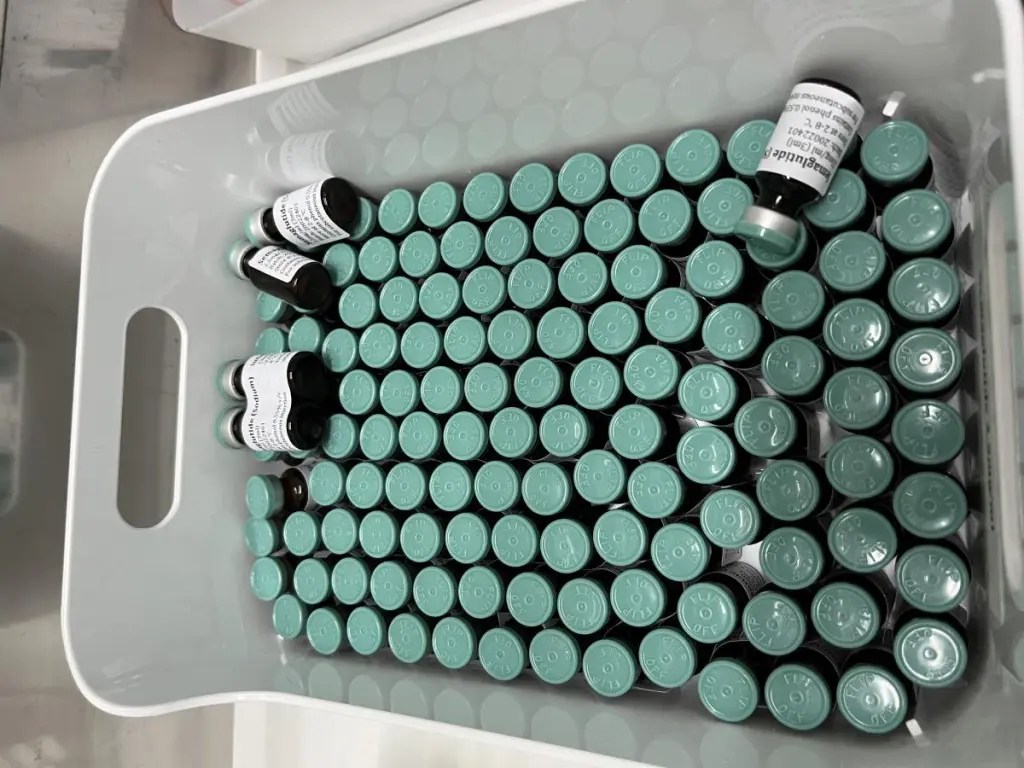The Therapeutic Goods Administration (TGA) is looking to ban ‘Ozempic dupes’ from being sold in Australian pharmacies, over fears legal loopholes are allowing dangerous and untested versions of the weight loss drug to flood the market.
Due to a legal loophole, pharmacist are able to mix up drugs containing semalgatude, the active ingredient in brand name weight loss drugs like Ozempic and Mounjaro — and healthcare companies like Eucalyptus are able to advertise the off-brand drug to customers.
They argue they’re performing an important role, due to Ozempic’s wide-spread popularity and subsequent shortage. However, experts worry this loophole is being misused, while eating disorder advocates are concerned with the booming weight loss drug industry altogether.
Here’s a breakdown of what the TGA is doing, and what it all means.

Why Is The TGA Trying To Ban Ozempic Dupes?
The proposed ban comes as surging demand for Ozempic has created a global shortage, with supply simply unable to keep up.
Australia is no exception to this demand, the number of patients using the drug has grown from 175,000 in 2022 to more than 268,000 last year.
Most of this interest is coming from “off-label” use. While the drug is designed as a diabetes medicine and is life-changing for many sufferers, it is also popular as a weight-loss product and is promoted heavily on social media.
It’s not exactly clear how many people are using it for this purpose, but the number is high. A recent study by researchers at Monash University in Melbourne found that one in ten young people have used an unapproved weight loss drug, like Ozempic, at some point in their life.
Why is this legal in the first place?
It all comes down to the active ingredient – semaglutide. When certain medicines are in short supply, the TGA allows some pharmacists, known as compounding pharmacists, to produce their own version to plug the gap.
This is supposed to be done on a case-by-case basis, and only once a pharmacy has received a prescription. However, the TGA alleges that pharmacists are instead creating semaglutide supplies in bulk and ahead of time, which is leading to concerns over safety and efficiency.
In a letter to stakeholders, the TGA said it was worried that there was no legal obligation for pharmacists and prescribers to report significantly adverse side effects. It also said there was a potential for “significant quality issues, such as bacterial and fungal contamination due to poor compounding practices”.
Head of the TGA Anthony Lawler said patients needed to understand there was a difference between regular and compounded medicine.
“Consumers need to understand that the safety of compounded medicines are not assessed by the TGA, and they are not subject to the same controls over the quality or efficacy of the goods when compared with medicines approved for supply in Australia,” he said.

What does Eucalyptus say?
One of the largest producers of compounded semaglutide in Australia is Eucalyptus, a Woolworths-backed company that began supplying customers with its own version of the medicine last year.
It disputes the TGA’s claims, with Eucalyptus clinical director Dr Matt Vickers saying that independent tests commissioned by the company found “the substances are safe, stable and efficacious for patients to use”.
“A complete ban on compounded semaglutide would be disproportionate while global shortages persist and would deny thousands of Australians access to medication that is changing their lives for the better,” he said.
“Instead, we think there are ways to ensure patient safety that strike an appropriate balance and we will continue to engage with the TGA to demonstrate this.”
What other concerns are there?
It’s not just quality concerns that have people worried either. According to the Eating Disorders Alliance (EDA), Ozempic is heavily promoted on social media and is all too easy to get from an online doctor, resulting in vulnerable people being put at risk.
The EDA says that virtual appointments cannot fully assess a person’s condition, and that vulnerable people are suffering as a result. It also points to the growing number of eating disorders in Australia, up 21% over the last decade, as a reason why such a ban would protect those most at risk.
“The Alliance had raised several significant concerns regarding the use of weight loss medications, particularly relating to pharmaceutical compounding, but also around the lack of comprehensive medical assessments required to access these versions of medication, particularly in telehealth consultations,” it said in a statement.
“This step demonstrates a commitment to addressing public health concerns and ensuring the safety and efficacy of medicines.”
It says alongside a ban of compounded versions, online promotion on social media needs to be reeled in, and virtual doctors appointments need to be better managed.
What’s next for compounded medicine?
So what happens next? Well, the TGA has begun consultation on the proposed ban, to hear feedback from producers and become aware of any unintended consequences. It says it will consider all stakeholder responses before announcing a final decision in July.
In the meantime, it will continue its crackdown on those skirting the law. And it’s doing so — just last week, a large amount of semaglutide was seized from a pharmacy in Melbourne, along with peptides and human growth hormones. Consequences for such production currently includes fines, as well as civil or criminal charges.

The TGA is also trying to squash demand at its source, by urging doctors not to prescribe semaglutide to new patients unless absolutely necessary. Further, they say it should only be prescribed for diabetes, and nothing else. However, these are recommendations and not enforceable by law.
Ultimately, it’s a story with two sides. The TGA does have legitimate concerns over the quality of the compounded drugs, and patients are left vulnerable to unregulated medicine. On the other hand, semaglutide is absolutely critical for thousands of people suffering diabetes, with it lengthening and improving countless lives. As such, a ban on compounded semaglutide could well worsen supply issues, and leave those who need it without. For now, it seems there is no clear answer.
- If you need support, give Butterfly Foundation a call on 1800 33 4673 or chat online.
- If you are in distress, please call Lifeline on 13 11 14 or chat online.
- Under 25? You can reach Kids Helpline at 1800 55 1800 or chat online.
The post Why Is Australia Moving To Ban ‘Ozempic Dupes’? The TGA’s Crackdown, Explained appeared first on PEDESTRIAN.TV .







